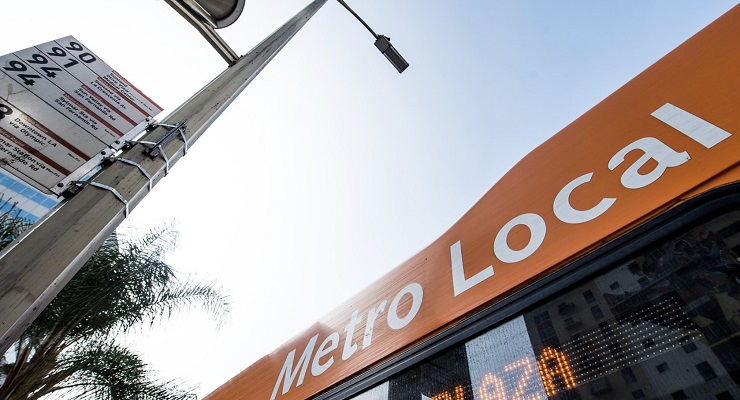
Ahead of the Los Angeles County Metropolitan Transportation Authority board’s vote next month on a Fareless System Initiative pilot program, board members today reviewed details and options within the pilot, which would make L.A. Metro buses and trains free to students starting in August.
L.A. Metro currently offers discounts to people who make $39,450 a year or less, people age 62 and older, veterans and people with disabilities, K-12 students and people in college or vocational school.
K-12 students and people enrolled in community college of all incomes would be the first to ride L.A. Metro fare-free under the pilot program presented to board members Thursday, with that phase expected to begin in August. Low-income riders, which make up 70% of Metro’s ridership, would be phased in starting in January 2022.
“We’ve got to get people back to school. Our community college district is suffering, our schools are suffering, our transit system is suffering,” Mayor Eric Garcetti said.
A 23-month pilot for K-12 students would cost $41,625,000 in lost fare revenue, and with community college students added to the pilot the total would be $49,179,167. Fare revenue pays for transit operations and maintenance, but Metro receives additional funding through sales tax and state and federal grants.
Additional funding options for the pilot identified by L.A. Metro officials include advertising revenue, cost-sharing and grant funds through the Traffic Reduction Program.
Garcetti said they will “leave no stone unturned when it comes to funding,” and emphasized the need for the federal government, the state and municipalities in the county to chip in. He added that organizations like LAUSD should provide funding, since the fareless system will likely increase school attendance and therefore increase school funding. He added that he is meeting with U.S. Secretary of Transportation Pete Buttigieg and will discuss funding for the program.
L.A. Metro CEO Phillip A. Washington expressed confidence that the federal government under President Joe Biden would provide funding for the pilot and permanent funding for a fareless Metro system in the future.
He noted that Los Angeles County is the most diverse county in the U.S. and the L.A. Metro system has the highest percentage of low-income riders in the country.
“So we believe that what we are doing fits right into the ‘Justice40 Initiative’ from the Biden-Harris administration… so what we are saying is that we are in the best position in this country with the hopeful approval of a pilot next month to be that test case for the federal government.”
In a survey with about 46,000 responses, L.A. Metro found that 86% of Metro riders and 80% of non-Metro riders support going fareless.
However, L.A. Metro’s Dennis Tucker told board members Thursday that an internal survey with 1,968 responses found that only about 45% of people within L.A. Metro support the fareless initiative.
Board member and L.A. County Supervisor Janice Hahn expressed concerns about the impact the fareless initiative would have on the quality of the transit system and become a “you get what you pay for” system where people aren’t paying so they have to expect problems.
“This board has been so clear about our service to our ridership so far. We really have wanted to put more money into our buses, we want to put more money into making stations clean and appropriate, and I’m a little concerned when staff says that we can cut some of what we spend on transit service without any impact,” she said.
“I think all of us are concerned that maybe at some point that would mean that would translate into dirtier buses, less service, dirtier stations, our buses and trains might break down more,” Hahn said.
The final Fareless System Initiative Study report is expected to be published in May ahead of the board’s vote, according to the L.A. Metro website.
The pilot would allow L.A. Metro to test the feasibility of permanently eliminating all fares on trains and buses. If the pilot is approved, L.A. Metro staff will report to the board each month on the status of the pilot program. Metrics that will evaluate the success of the program may include financial sustainability, program participation, increased boarding by pilot participants, level of service, quality of services, increased trips by low-income riders, employee safety, rider safety, and system security, according to L.A. Metro Principal Transportation Planner Doreen Morrissey.
Tucker told board members that the program would provide financial relief to low-income riders and students and bring back ridership to the Metro system.
“We would be the largest transit agency in the world to implement such a program,” said Metro CEO Phillip A. Washington.


















